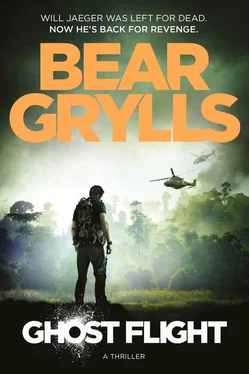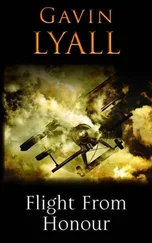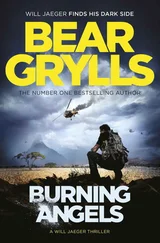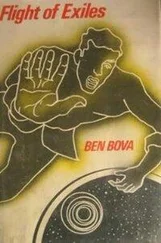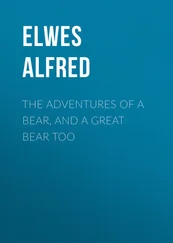At a top-secret school for mayhem and murder, they’d been shown how to hurt, maul, injure and kill with ease. Their instructors had been the legendary William Fairbairn and Eric ‘Bill’ Sykes, who over the years had perfected the means to terminate silently, at close quarters.
From Wilkinson Sword, Sykes and Fairbairn had commissioned a combat knife to be used by Churchill’s special volunteers. It had a seven-inch blade, a heavy handle to give firm grip in the wet, plus razor edges and a sharp stabbing profile.
The knives had rolled off Wilkinson Sword’s London production line. Etched on the square head of each were the words: ‘The Fairbairn–Sykes Fighting Knife’. Fairbairn and Sykes had taught the special volunteers that there was no more deadly weapon at close quarters, and most importantly, ‘It never runs out of ammunition.’
Jaeger had never got to see Narov use her blade in anger. But the fact that she’d chosen to carry such a knife – the same as his grandfather had used – had somehow drawn him to her, though he’d never got the chance to ask her where she had got it, or what exactly it might mean to her.
He wondered how she’d come by it: a Russian; a veteran of the Spetsnaz, with a British commando knife. And why that comment she’d made – good for killing Germans ? During the war, every British commando and SAS soldier had been issued with one of those knives; doubtless the iconic blade had accounted for more than its fair share of the Nazi enemy.
But that was many decades and a whole world ago.
Jaeger replaced the knife on his belt.
For a brief moment he wondered if he’d been wrong; wrong to insist that Narov come with him. If he’d done as she’d asked and left her, she more than likely would still be alive. But it was in his DNA never to leave a man behind – or woman, for that matter – and anyway, how long would she have lasted?
No. The more he thought about it, the more he knew that he had done the right thing. The only thing. She’d have perished either way. If he’d left her, she’d just have died a longer, lingering death, and she’d have died alone.
Jaeger forced all thoughts of Narov to the back of his mind.
He took stock. A daunting journey lay ahead: twenty-plus kilometres through thick jungle with only two litres of clean water to sustain him. A human could survive without food for many days; not so water. He’d have to ration himself strictly: a gulp every hour; nine gulps per bottle; eighteen hours walking, max.
He checked his watch.
Last light was barely two hours away. If he was to get to that sandbar in time to make the emergency RV, he’d most likely have to keep marching through the night hours, which was a big no-no in the jungle. It was impossible to see in the pitch black beneath the night-dark canopy.
He had nothing with which to defend himself, apart from his bare hands and his knife. If he stumbled into serious trouble, the only thing to do would be to run. He had one advantage: with Narov gone, he no longer had her weight to slow him down.
He was equipped only with what he stood up in, which meant he could move fast. All things considered, he figured he stood a half-decent chance. But even so, he dreaded the coming journey.
He got to his feet, placed the compass in the palm of his hand and took a first bearing. The point he’d aim for was a fallen tree trunk lying more or less due south – the direction in which he needed to travel. He replaced the compass, bent down and picked up ten small pebbles, placing them in his pocket. Every ten paces he’d transfer one pebble to his other pocket. When all had been moved across he’d have completed a hundred paces.
From long experience Jaeger knew that it would take seventy left footfalls for him to cover 100 metres of terrain, on the flat and under a light load. With a full pack, plus weapon and ammo, it would take him eighty, for the legs made less of a stride under a heavy load. When going steeply uphill, it might take him one hundred left footfalls.
The passing of the pebbles was a simple system that had worked for him countless times during epic yomps across tough terrain. And moving them from pocket to pocket would keep his mind focused and busy.
He did one last thing before setting out: he grabbed a pen and marked his present position. Next to it he wrote: ‘Last known location of Irina N.’
That way, if he ever got the chance, he could return to this spot and search methodically, with time and manpower, for her remains. At least that way they’d have something to return to her family – not that Jaeger had any idea who or where her family might be.
He set off walking; walking and counting.
He moved deeper into the forest, clicking a stone from one pocket to the other with each ten paces. One hour in and it was time for his first quick gulp of water and a map check.
He marked his position on the map – two kilometres due south of the riverbank – took a bearing and pressed onwards. In theory, he could navigate his way the whole distance through the jungle to that sandbar using the simple process of pacing and bearing. Whether he’d make it or not, with two litres of water and no weaponry, was another matter entirely.
Even as his lone form was swallowed by the gloom of the dense jungle, Jaeger could sense that those mystery eyes were upon him still, watching from the shadows.
As he pushed ahead into the dark, brooding forest, his left hand gripped his pocket full of pebbles, his lips moving as they counted out his footfalls.
Far away, across several hundred miles of jungle, another voice was speaking.
‘Grey Wolf, this is Grey Wolf Six,’ the voice intoned. ‘Grey Wolf, Grey Wolf Six. Do you copy?’
The speaker was hunched over a radio set in a camouflaged tent positioned at the edge of a rough and ready airstrip. To all sides lay a sagging fringe of trees, with hills in the distance rearing up against a ragged grey sky. A rank of black helicopters with drooping rotor blades lined the dirt runway.
Otherwise, it was empty.
The scenery was reminiscent of the Serra de los Dios, but somehow not the same.
Close, but not too close.
This was the South American jungle, but somewhere higher in the mountains; somewhere remote and undisturbed, hidden amongst the wild and lawless Andean foothills that rolled onwards into Bolivia and Peru. Somewhere perfect for the kind of black operation that was designed to make a Second World War aircraft disappear forever; to vanish off the face of the earth.
‘Grey Wolf, Grey Wolf Six,’ the radio operator repeated. ‘Do you copy?’
‘Grey Wolf Six, this is Grey Wolf,’ a voice confirmed. ‘Send, over.’
‘Team inserted as planned,’ the operator announced. ‘Awaiting further orders.’
He listened for a few seconds to whatever was being said. Whoever this man – this soldier – was, there wasn’t a single mark of unit or rank, or even of nationality, to be seen on his plain, drab-green jungle fatigues. To either side of him, the tent was equally lacking in identifying features. Even the helicopters lined up on the airstrip were devoid of decals, flight numbers or national flags of any sort.
‘Yes, sir,’ the operator confirmed. ‘I have sixty sets of boots on the ground. It wasn’t easy, but we got them in there.’
He listened for a few seconds to his instructions, then repeated them back to confirm he’d understood them
‘Use all means to secure the coordinates of the warplane. Spare no one in the search for its exact whereabouts. Understood.’
There was a further short burst of message before the operator gave his final response.
‘Understood, sir. Their force is ten strong, of which all are to be eliminated. No survivors. Grey Wolf Six, out.’
Читать дальше
